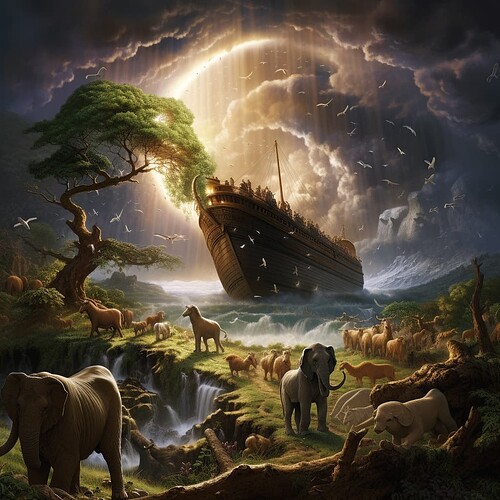Embark on an in-depth exploration of Genesis 5 and 6, chapters that offer valuable insights into the early days of humanity and the events leading up to the Great Flood. These chapters delve into the genealogy from Adam to Noah and the escalation of sin that prompted God’s dramatic intervention.
 Genesis 5 - From Adam to Noah:
Genesis 5 - From Adam to Noah:
- Genesis 5 provides the genealogy tracing from Adam to Noah. This lineage not only maps the descendants of Adam but also gives us a glimpse into the longevity of early humanity and sets the stage for the narrative of Noah.
- Key Verse:
‘When Enoch had lived 65 years, he became the father of Methuselah. After he became the father of Methuselah, Enoch walked faithfully with God 300 years and had other sons and daughters.’ - Genesis 5:21-22
- These verses highlight the extraordinary life of Enoch, who ‘walked with God’ and was taken to heaven without experiencing death. Enoch’s unique relationship with God amidst a genealogy primarily focused on lifespans and procreation stands out as a beacon of faithfulness.
 Genesis 6 - The Prelude to the Flood:
Genesis 6 - The Prelude to the Flood:
- In Genesis 6, we witness the increasing wickedness of humanity and God’s decision to cleanse the earth through the Flood. Amidst this backdrop, Noah’s righteousness shines as a contrast to the prevailing corruption.
- Key Verse:
‘Noah found favor in the eyes of the LORD.’ - Genesis 6:8
- This verse encapsulates the theme of grace and favor in a world marred by sin. Noah’s favor with God sets him apart, leading to his pivotal role in God’s plan of redemption and the preservation of life through the Ark.
 Reflective Q&A:
Reflective Q&A:
 Genealogical Significance:
Genealogical Significance:
- Question: What significance does the genealogy in Genesis 5 hold?
- Answer: The genealogy illustrates the continuity of humanity from creation, God’s ongoing plan through generations, and hints at the coming redemption through Noah.
 Noah’s Righteousness:
Noah’s Righteousness:
- Question: How does Noah’s character stand out in Genesis 6?
- Answer: Amidst widespread corruption, Noah’s righteousness exemplifies obedience and faith in God, making him a key figure in God’s plan for humanity’s salvation.
 Lessons from the Flood:
Lessons from the Flood:
- Question: What lessons can we draw from God’s decision to send the flood?
- Answer: The flood narrative illustrates the gravity of sin and the necessity of divine intervention, yet also highlights God’s mercy and the possibility of a new beginning through Noah.
 Reflective Thoughts:
Reflective Thoughts:
- Reflect on the role of individual choices and righteousness in a world inclined towards corruption. How does this relate to your own life and spiritual journey?
- Consider the implications of Enoch’s life and Noah’s faithfulness in the broader narrative of human history and God’s redemptive plan.
 Let’s Discuss:
Let’s Discuss:
- Share your thoughts or queries about these foundational chapters of Genesis. How do these narratives of genealogy and the Great Flood impact your understanding of sin, righteousness, and redemption?
 See You Tomorrow:
See You Tomorrow:
- Join us again tomorrow as we continue our journey through Genesis. Explore the full January reading schedule here.
Join us on this profound journey through Genesis. Dive deeper each day, and let’s grow together in faith and understanding.
 Stay Connected:
Stay Connected:
- Don’t miss a day of our exploration through the scriptures. Subscribe to the AIgniteScripture Newsletter for daily readings and insights. Subscribe here.
genesis #Genealogy #GreatFlood #BibleReading #AIgniteScripture #DailyDevotional"
